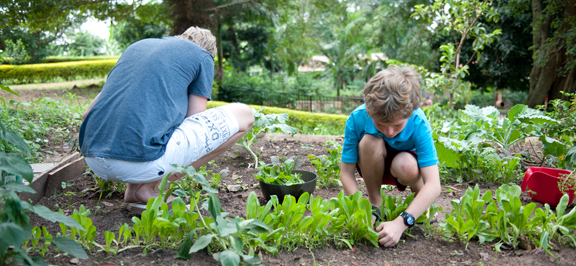
(The Hamilton Spectator – Saturday, October 8, 2016)
MUKONO, UGANDA — Someone (a writer, naturally) once said that writing is like prayer. Prayer, it seems to me, is like gardening. I’ve struggled with all three.
The small garden behind our African home is testament to this. Many seasons it’s been a disappointing annoyance. Nearby trees steal valuable sunlight and nutrients. I suppose the space should never have been chosen to start.
But it is and we’ve worked to tend and nourish it. And when my son pulls even a modest carrot, or eats even a spindly green bean, or harvests even average cabbage or lettuce and, with his boyhood grin, says, “Look Dad!” this is when the thanks is greater and the wonder is deeper and we could say that oldest of prays, “thank you,” right there in the mud.
Africa is different in this regard. It’s different from parts of the world where thanking the Almighty for one’s food is out-of-vogue. These are places where, if table grace was a woman, she’d be on senior’s benefits, gray-haired and wearing a hopeless hat, (not the worst image, mind you, considering the power in the prayers of some senior women.)
It was Thanksgiving 1951 when the Saturday Evening Post published, “Saying Grace,” with such a woman on its cover. There she is in some restaurant, sitting with a boy who has jug-handle ears, likely her grandson, giving thanks together, curious onlookers even back then looking dismayed.
This Thanksgiving season, that illustration turns 65. An all-time reader favourite of 322 Post covers that Norman Rockwell painted, it earned him US $3,500. That’s about US $32,000 in today’s dollars. After Thanksgiving 2013, the original was auctioned for US $46 million.
During our years here in Uganda, well over 100 Canadian guests have sat around our own dinner table, some for Thanksgiving. Some, I suspect, have been far more interested in the food than the grace.
This would be like my own boyhood experiences when I’d mumble, more by rote than anything, (and in another tongue), my family’s grace. One recent breakfast, I said it again, that old mealtime prayer, clearly now, for my wife. We got talking about it, about thankfulness and its nourishing nature.
She’d just given money to a Ugandan with AIDS, the sort of human being who’s outlived his time. Her opportunity for that simple act of kindness made her so thankful: feeling the hand of a stranger in her own, touching that thin human hand, part of that thin human body. “I’d never have that sort of relationship in Canada,” she told me.
You can’t live in some places without these very human connections: reminders that whether your world is one of plenty or want, there’s little that you or I or anyone can take credit for, not when we slow down enough to think it through, the divine nature in even how food comes into this world.
This is why people of one colour or another, speaking one language or another, living in one place or another, still pause to give thanks in one way or another.
There, the soldier in her foxhole. Or the drunk in Apartment 5. Or that homeless kid at the shelter. Or maybe the refugee, your new neighbour. Or there, in that restaurant, there it is, the scene, someone, even this Thanksgiving weekend, bowing publicly without care.
It doesn’t make the food taste better or the drink go down smoother. It won’t bring the prayer whisperer to some place where he might long to return. What it does is acknowledge the plain fact that there’s more to life than meets the eye.
Writers have their own prayers, of course, just like they have their own gardens. I’ve learned this, even as I’ve learned that writers, by nature, are often a rather insecure lot.
Sometimes they expect – like gardening here in the heart of Africa, with lush rainforest all around – that the fruits of their labour might somehow come with less effort. But it doesn’t.
The lucky ones keep at it, though. Then again, what choice do they have?
They realize that this too is the nature of things, that you never know what might find its way through even unpromising ground.
+
